克隆利弊的英语作文3篇_0
关于克隆好处与坏处的英语作文
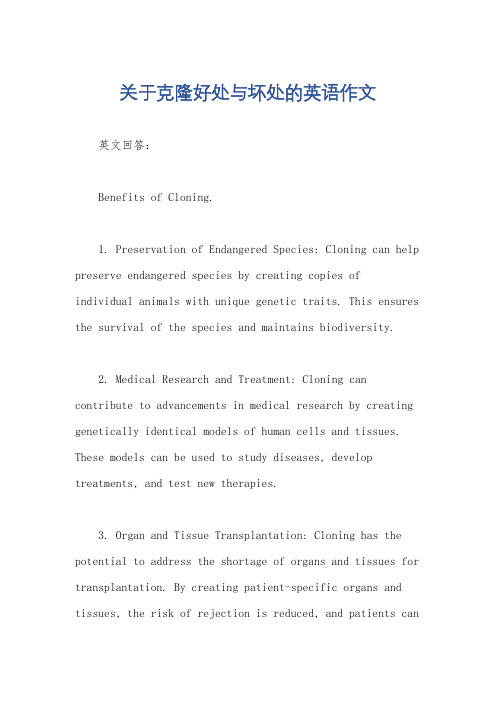
关于克隆好处与坏处的英语作文英文回答:Benefits of Cloning.1. Preservation of Endangered Species: Cloning can help preserve endangered species by creating copies ofindividual animals with unique genetic traits. This ensures the survival of the species and maintains biodiversity.2. Medical Research and Treatment: Cloning can contribute to advancements in medical research by creating genetically identical models of human cells and tissues. These models can be used to study diseases, develop treatments, and test new therapies.3. Organ and Tissue Transplantation: Cloning has the potential to address the shortage of organs and tissues for transplantation. By creating patient-specific organs and tissues, the risk of rejection is reduced, and patients canreceive life-saving treatments.4. Animal Husbandry and Agriculture: Cloning can improve animal breeding practices in agriculture. By creating clones of animals with desired traits, such as enhanced productivity, disease resistance, or growth rate, farmers can increase the efficiency and profitability of their operations.5. Genetic Engineering: Cloning techniques can be combined with genetic engineering to create animals with specific genetic modifications. This has applications in research, agriculture, and medicine, allowing scientists to create organisms with desirable traits or to study the effects of gene mutations.Drawbacks of Cloning.1. Ethical Concerns: Cloning raises ethical concerns about the creation of genetically identical individuals and the potential for human reproductive cloning. Ethical guidelines are necessary to ensure the responsible use ofcloning technology.2. Genetic Diversity: Cloning may reduce genetic diversity within a species, making them more susceptible to disease outbreaks or environmental changes. Genetic diversity is crucial for the survival and resilience of populations.3. Unforeseen Medical Consequences: The long-term health effects of cloning are not yet fully understood. Cloned animals may face health issues that are not evident in the original animal, raising concerns about their well-being.4. Cost and Accessibility: Cloning is a complex and expensive procedure, which may limit its accessibility for certain individuals or organizations. Equitable access to cloning technology is important to ensure its benefits are not concentrated among a few.5. Animal Welfare Concerns: Cloning involves procedures that may cause discomfort or distress to animals used inthe process. Ensuring the humane treatment of animals is essential when considering cloning.中文回答:克隆的优点。
克隆的好处坏处英语作文

克隆的好处坏处英语作文Benefits and Drawbacks of Cloning.English Response:Cloning, the process of creating an exact replica or genetically identical copy of an existing organism, is a groundbreaking technique with far-reaching implications. It offers immense potential for advancements in fields such as medicine, agriculture, and conservation, but it also raises ethical concerns that require careful consideration.One of the most promising benefits of cloning lies in its potential to revolutionize the medical field. By cloning stem cells, scientists can grow replacement tissues and organs, offering hope for patients suffering from debilitating diseases such as Parkinson's and Alzheimer's. Cloning could also facilitate the creation of personalized treatments tailored to an individual's genetic makeup, improving the efficacy of therapies and reducing sideeffects.Moreover, cloning has the potential to enhance agricultural practices. By cloning livestock with desirable traits, farmers can improve the quality and productivity of their herds, leading to increased food security. Cloning techniques can also be utilized to preserve endangered species, allowing for the recovery of populations that have been decimated by habitat loss or hunting.However, cloning also comes with several ethical drawbacks. One major concern lies in the potential misuse of cloning for reproductive purposes. Creating human clones raises fundamental questions about the right to life, personal identity, and informed consent. Moreover, the genetic uniformity resulting from cloning could increase the risk of genetic disorders and reduce genetic diversity in populations.Another ethical issue associated with cloning is the potential for animal suffering. Cloning animals for commercial purposes could result in the mass production ofanimals that may not receive adequate care and attention. Additionally, the cloning process itself can be stressful and can lead to health problems for the cloned animals.中文回答:克隆的优点和缺点。
克隆的利弊辩论赛英语作文
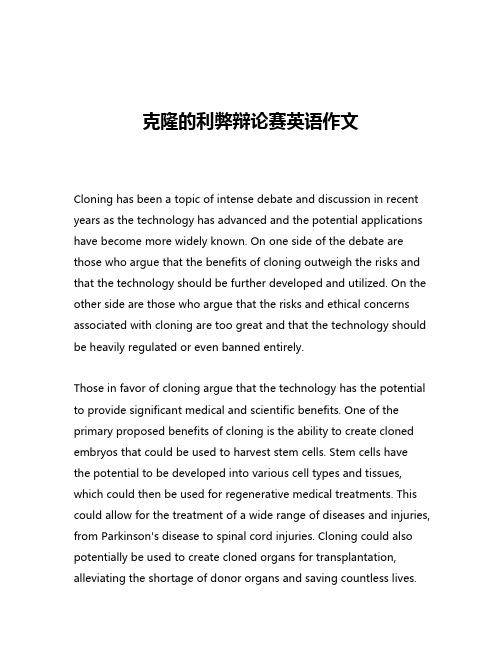
克隆的利弊辩论赛英语作文Cloning has been a topic of intense debate and discussion in recent years as the technology has advanced and the potential applications have become more widely known. On one side of the debate are those who argue that the benefits of cloning outweigh the risks and that the technology should be further developed and utilized. On the other side are those who argue that the risks and ethical concerns associated with cloning are too great and that the technology should be heavily regulated or even banned entirely.Those in favor of cloning argue that the technology has the potential to provide significant medical and scientific benefits. One of the primary proposed benefits of cloning is the ability to create cloned embryos that could be used to harvest stem cells. Stem cells have the potential to be developed into various cell types and tissues, which could then be used for regenerative medical treatments. This could allow for the treatment of a wide range of diseases and injuries, from Parkinson's disease to spinal cord injuries. Cloning could also potentially be used to create cloned organs for transplantation, alleviating the shortage of donor organs and saving countless lives.Additionally, proponents of cloning argue that the technology could be used to preserve the genetic information of endangered species, allowing for the potential future reintroduction of these species. This could be particularly valuable for species that are on the brink of extinction due to human activities or environmental changes. Cloning could also potentially be used to create cloned copies of beloved pets, allowing pet owners to continue to enjoy the companionship of their animals even after they have passed away.Furthermore, some argue that cloning could have important implications for human reproduction, allowing infertile individuals or same-sex couples to have genetically related children. This could provide a means for these individuals to experience the joys of parenthood and pass on their genetic legacies.However, those opposed to cloning argue that the technology raises significant ethical and moral concerns that outweigh the potential benefits. One of the primary concerns is the potential for the technology to be misused or abused. There are fears that cloning could be used to create "designer babies" with desirable genetic traits, leading to a new form of genetic discrimination and inequality. There are also concerns that cloning could be used for nefarious purposes, such as the creation of cloned soldiers or the cloning of political or social leaders.Additionally, opponents of cloning argue that the process of creating a cloned embryo is inherently risky and can lead to significant health problems for the clone. There is a high rate of failure and abnormalities associated with cloning, and many cloned animals have been found to have a range of health issues, including increased rates of cancer, premature aging, and organ dysfunction. There are concerns that these same issues could manifest in cloned humans, leading to significant physical and psychological harm.Moreover, opponents of cloning argue that the technology raises profound ethical and philosophical questions about the nature of human identity and the sanctity of human life. There are concerns that cloning could undermine the uniqueness of each individual and lead to a devaluation of human life. There are also concerns that cloning could have significant implications for the traditional family structure and the way in which we think about parenthood and kinship.In conclusion, the debate over the pros and cons of cloning is a complex and multifaceted one, with valid arguments on both sides. While the potential benefits of cloning, such as the development of regenerative medical treatments and the preservation of endangered species, are significant, the ethical and moral concerns associated with the technology are also substantial. Ultimately, the decision ofwhether to further develop and utilize cloning technology will require careful consideration of the evidence and a thoughtful weighing of the potential risks and rewards.。
克隆和不克隆的总结英语作文

克隆和不克隆的总结英语作文Cloning has become a hot topic in modern science, raising ethical and moral concerns as well as scientific possibilities.克隆已成为现代科学中的一个热门话题,引发了伦理道德方面的担忧以及科学可能性。
On one hand, cloning technology offers the potential to duplicate organisms, including human beings, for various purposes such as disease research and organ transplants.一方面,克隆技术为复制生物体(包括人类)提供了可能,可用于疾病研究和器官移植等多种目的。
However, the ethical implications of cloning are vast and complex, raising questions about the rights of cloned individuals, the natural order of life, and the potential misuse of this technology. 然而,克隆的伦理含义广泛而复杂,引发了关于克隆个体权利、生命自然秩序以及该技术可能被滥用的问题。
Moreover, cloning does not guarantee an exact replica of the original organism, and there may be unexpected genetic defects or health issues in cloned individuals.此外,克隆并不能保证完全复制原始生物体,克隆个体中可能会出现意想不到的遗传缺陷或健康问题。
克隆利弊的英文作文
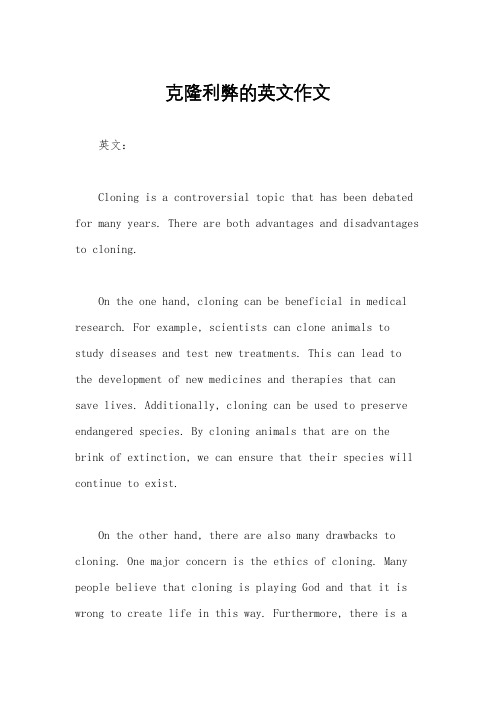
克隆利弊的英文作文英文:Cloning is a controversial topic that has been debated for many years. There are both advantages and disadvantages to cloning.On the one hand, cloning can be beneficial in medical research. For example, scientists can clone animals to study diseases and test new treatments. This can lead to the development of new medicines and therapies that can save lives. Additionally, cloning can be used to preserve endangered species. By cloning animals that are on the brink of extinction, we can ensure that their species will continue to exist.On the other hand, there are also many drawbacks to cloning. One major concern is the ethics of cloning. Many people believe that cloning is playing God and that it is wrong to create life in this way. Furthermore, there is arisk that cloning could lead to a reduction in genetic diversity, which could make certain species more vulnerable to disease and other threats.In my opinion, cloning has both advantages and disadvantages. While it can be beneficial in medical research and conservation efforts, it is important to consider the ethical implications of cloning. We must also be aware of the potential risks and drawbacks of cloning.中文:克隆是一个备受争议的话题,已经被辩论了很多年。
对克隆人的看法,好处和坏处英语作文
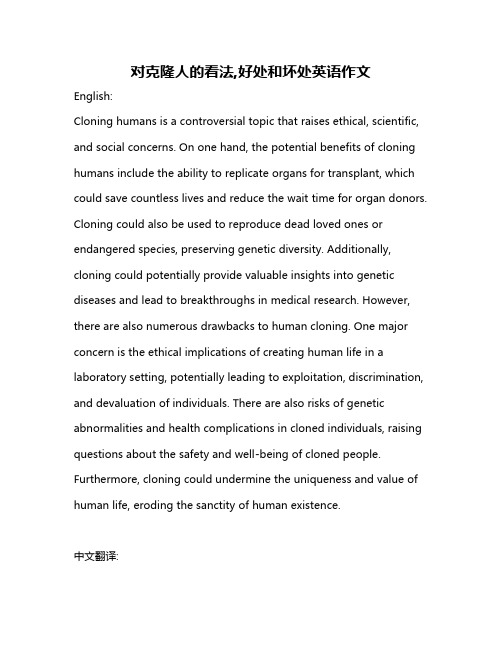
对克隆人的看法,好处和坏处英语作文English:Cloning humans is a controversial topic that raises ethical, scientific, and social concerns. On one hand, the potential benefits of cloning humans include the ability to replicate organs for transplant, which could save countless lives and reduce the wait time for organ donors. Cloning could also be used to reproduce dead loved ones or endangered species, preserving genetic diversity. Additionally, cloning could potentially provide valuable insights into genetic diseases and lead to breakthroughs in medical research. However, there are also numerous drawbacks to human cloning. One major concern is the ethical implications of creating human life in a laboratory setting, potentially leading to exploitation, discrimination, and devaluation of individuals. There are also risks of genetic abnormalities and health complications in cloned individuals, raising questions about the safety and well-being of cloned people. Furthermore, cloning could undermine the uniqueness and value of human life, eroding the sanctity of human existence.中文翻译:克隆人是一个引发伦理、科学和社会关切的颇具争议的话题。
克隆的好处坏处英语作文
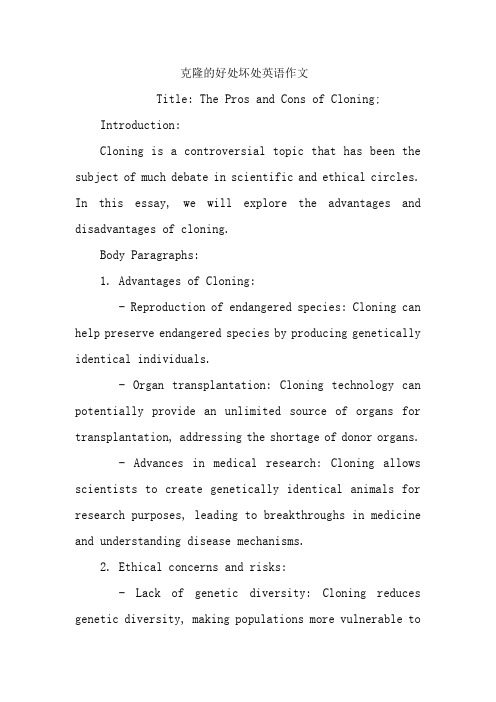
克隆的好处坏处英语作文Title: The Pros and Cons of Cloning;Introduction:Cloning is a controversial topic that has been the subject of much debate in scientific and ethical circles. In this essay, we will explore the advantages and disadvantages of cloning.Body Paragraphs:1. Advantages of Cloning:- Reproduction of endangered species: Cloning can help preserve endangered species by producing genetically identical individuals.- Organ transplantation: Cloning technology can potentially provide an unlimited source of organs for transplantation, addressing the shortage of donor organs.- Advances in medical research: Cloning allows scientists to create genetically identical animals for research purposes, leading to breakthroughs in medicine and understanding disease mechanisms.2. Ethical concerns and risks:- Lack of genetic diversity: Cloning reduces genetic diversity, making populations more vulnerable todiseases and environmental changes.- Moral and ethical dilemmas: Cloning raises ethical questions regarding the value of individuality, the sanctity of life, and the potential for exploitation of cloned organisms.- Health risks: Cloned organisms may suffer from health issues, such as premature aging and genetic abnormalities, due to errors in the cloning process.3. Cloning in agriculture:- Increased food production: Cloning can ensure the production of genetically superior crops and livestock with desirable traits.- Loss of biodiversity: Cloning can lead to a decrease in biodiversity as a limited number of clones dominate agricultural systems, reducing resilience to pests and diseases.4. Reproductive cloning in humans:- Infertility treatment: Cloning technology could potentially help infertile couples have genetically related children.- Psychological and social implications: Cloning humans raises concerns about the impact on familyrelationships, personal identity, and societal norms.Conclusion:In conclusion, cloning presents both advantages and disadvantages. While it offers opportunities for scientific advancement, conservation efforts, and medical breakthroughs, it also raises ethical concerns, risks to genetic diversity, and potential negative consequences. As we continue to explore cloning technology, it is vital to consider the moral, ethical, and societal implications associated with it.。
克隆利弊 英文作文
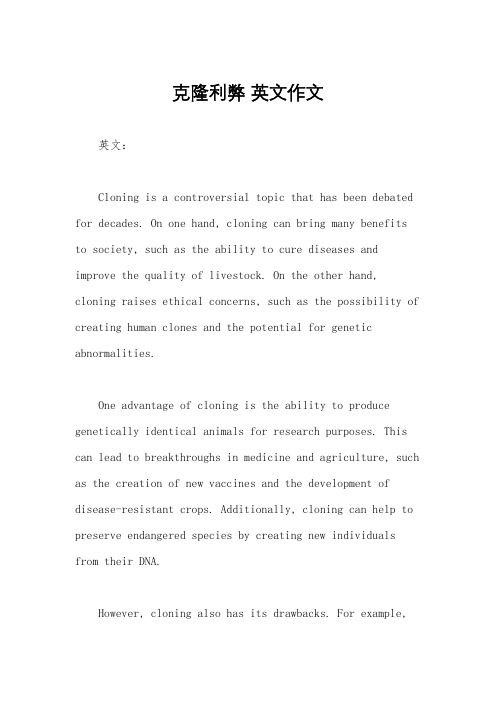
克隆利弊英文作文英文:Cloning is a controversial topic that has been debated for decades. On one hand, cloning can bring many benefits to society, such as the ability to cure diseases and improve the quality of livestock. On the other hand, cloning raises ethical concerns, such as the possibility of creating human clones and the potential for genetic abnormalities.One advantage of cloning is the ability to produce genetically identical animals for research purposes. This can lead to breakthroughs in medicine and agriculture, such as the creation of new vaccines and the development of disease-resistant crops. Additionally, cloning can help to preserve endangered species by creating new individuals from their DNA.However, cloning also has its drawbacks. For example,the process of cloning can be expensive and time-consuming, and the success rate is relatively low. Moreover, there isa risk of genetic abnormalities and health problems in cloned animals, which can lead to suffering and decreased quality of life.In terms of human cloning, the ethical concerns areeven greater. The creation of human clones raises questions about individual identity, human dignity, and the potential for abuse. Additionally, there are concerns about thesafety and health of cloned humans, as well as the social and psychological effects of being a clone.In conclusion, cloning has both advantages and disadvantages. While it can bring many benefits to society, such as medical breakthroughs and conservation efforts, it also raises ethical concerns and comes with potential risks. Therefore, it is important to carefully consider the consequences of cloning before pursuing it further.中文:克隆是一个备受争议的话题,已经被争论了数十年。
克隆人类的好处与坏处英语作文

克隆人类的好处与坏处英语作文英文回答:Cloning humans is a controversial topic that comes with both benefits and drawbacks. On one hand, cloning humans could potentially help in medical advancements and treatments. For example, cloning could be used to create organs for transplant, reducing the need for organ donors and saving lives. Additionally, cloning could also help in studying genetic diseases and finding cures for them.However, there are also significant ethical concerns associated with human cloning. For instance, cloning raises questions about individuality and uniqueness. If humans are cloned, would they have their own identities or would they simply be replicas of existing individuals? This could lead to issues of self-identity and personal autonomy. Furthermore, there are concerns about the potential misuse of cloning technology for nefarious purposes, such as creating a superior race or cloning individuals forunethical reasons.In conclusion, while human cloning has the potential to bring about positive advancements in medicine, it alsoraises serious ethical concerns that must be carefully considered.中文回答:克隆人类是一个备受争议的话题,既有好处也有坏处。
克隆的危害英语作文
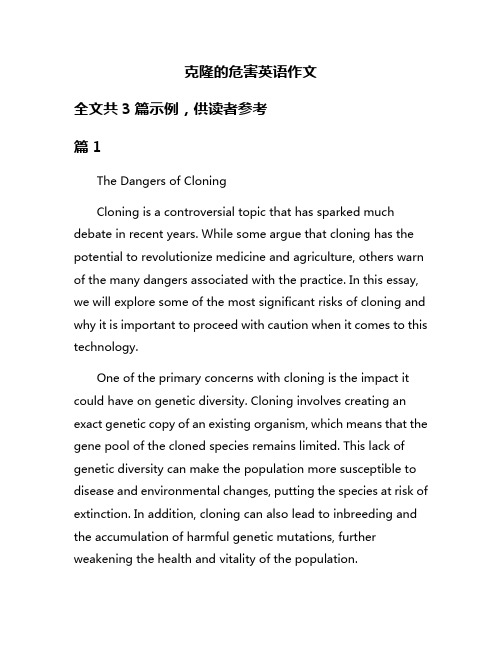
克隆的危害英语作文全文共3篇示例,供读者参考篇1The Dangers of CloningCloning is a controversial topic that has sparked much debate in recent years. While some argue that cloning has the potential to revolutionize medicine and agriculture, others warn of the many dangers associated with the practice. In this essay, we will explore some of the most significant risks of cloning and why it is important to proceed with caution when it comes to this technology.One of the primary concerns with cloning is the impact it could have on genetic diversity. Cloning involves creating an exact genetic copy of an existing organism, which means that the gene pool of the cloned species remains limited. This lack of genetic diversity can make the population more susceptible to disease and environmental changes, putting the species at risk of extinction. In addition, cloning can also lead to inbreeding and the accumulation of harmful genetic mutations, further weakening the health and vitality of the population.Another major danger of cloning is the ethical implications it raises. The process of cloning involves creating and then destroying numerous embryos in order to perfect the technique, which raises serious moral questions about the value of human life and the sanctity of the individual. Cloning also blurs the line between reproduction and creation, leading to complex issues surrounding identity, autonomy, and consent.Furthermore, cloning can have unintended consequences on the environment and ecosystem. Introducing cloned organisms into an ecosystem can disrupt the delicate balance of nature, potentially leading to the displacement or extinction of native species. In agriculture, cloning can lead to the proliferation of monocultures, which are highly susceptible to pests and diseases and can have devastating effects on local ecosystems.In addition to these ecological and ethical concerns, there are also practical risks associated with cloning. The process of cloning is not perfect, and there is a high rate of failure and abnormalities in cloned organisms. These abnormalities can lead to a range of health problems in the cloned individual, including premature aging, organ dysfunction, and developmental disorders. This can result in unnecessary suffering for the clonedindividual and raise serious questions about the ethics of cloning.In conclusion, cloning is a powerful technology that has the potential to offer many benefits in medicine, agriculture, and conservation. However, it also poses significant risks to genetic diversity, ethics, the environment, and the health of the cloned individual. It is important to proceed with caution and carefully consider the implications of cloning before moving forward with its widespread adoption. Only by weighing the potential benefits against the serious dangers can we ensure that cloning is used responsibly and ethically in the future.篇2The Hazards of CloningCloning, the process of creating an exact genetic replica of an organism, has been a topic of much debate and controversy since the first successful cloning of a sheep named Dolly in 1996. While some see cloning as a promising scientific advancement with the potential to improve human health and cure diseases, others believe that it poses serious ethical and moral concerns.One of the main hazards of cloning is the potential for genetic abnormalities in cloned animals. Studies have shown thatcloned animals often suffer from a range of health problems, including enlarged organs, immune deficiencies, and premature aging. This is because the process of cloning involves manipulating and altering the genetic material of an organism, which can lead to unintended mutations and genetic defects.In addition to the health risks posed to cloned animals, there are also concerns about the impact of cloning on biodiversity. Cloning can reduce genetic diversity within a species, which makes populations more vulnerable to disease and environmental changes. This lack of genetic variation can also lead to inbreeding and the accumulation of harmful genetic mutations over time.Furthermore, the ethical implications of cloning are a major concern for many people. The idea of creating life in a laboratory and manipulating genetic material raises questions about the sanctity of life and the rights of cloned organisms. There are also concerns about the potential misuse of cloning technology, such as the creation of designer babies or the cloning of endangered species for commercial purposes.Overall, the hazards of cloning are numerous and significant. While cloning may hold promise for the future of medicine and biotechnology, it is important to consider the ethical, moral, andscientific implications of this technology before proceeding with further research and development. The potential risks and consequences of cloning must be carefully weighed against any potential benefits in order to ensure the responsible and ethical use of this powerful technology.篇3Title: The Hazards of CloningCloning, a controversial and ethically complex practice, raises a number of serious concerns and potential risks. While some argue that cloning may have beneficial applications in medical research and technology, it also comes with a range of ethical, social, and environmental hazards that cannot be ignored.One of the primary hazards of cloning is the potential for abuse and exploitation. The ability to create genetically identical copies of living organisms raises concerns about the commodification of life and the potential for the creation of "designer" babies. Cloning could be used to perpetuate inequality by allowing those with the financial means to create cloned offspring while denying others access to the technology.Additionally, cloning raises serious ethical questions about the sanctity of life and the nature of individuality. Cloned organisms may not have the same rights and protections as naturally conceived individuals, leading to potential violations of their dignity and autonomy. The process of cloning itself also raises concerns about the welfare of the cloned organisms, as they may be subjected to physical and psychological harm in the name of scientific advancement.From a social perspective, cloning could have serious implications for family dynamics and relationships. Cloned children may face unique challenges in terms of identity formation and social integration, as they may struggle to establish their own sense of self separate from their genetic donors. Families may also experience disruptions and conflicts as a result of the introduction of cloned individuals into existing family structures.Furthermore, the environmental impacts of cloning must be considered. The mass production of cloned organisms could have negative consequences for biodiversity and ecosystem stability, as clones may lack genetic diversity and resilience to environmental changes. Cloned organisms may also pose a riskto native species if they escape into the wild and outcompete or interbreed with natural populations.In conclusion, while cloning may hold promise for scientific innovation and medical breakthroughs, it also poses significant hazards and challenges that must be carefully considered and addressed. It is crucial that society engages in thoughtful and informed dialogue about the ethical implications of cloning in order to ensure that the potential benefits of this technology do not come at the expense of our values, principles, andwell-being.。
克隆利弊 英语作文
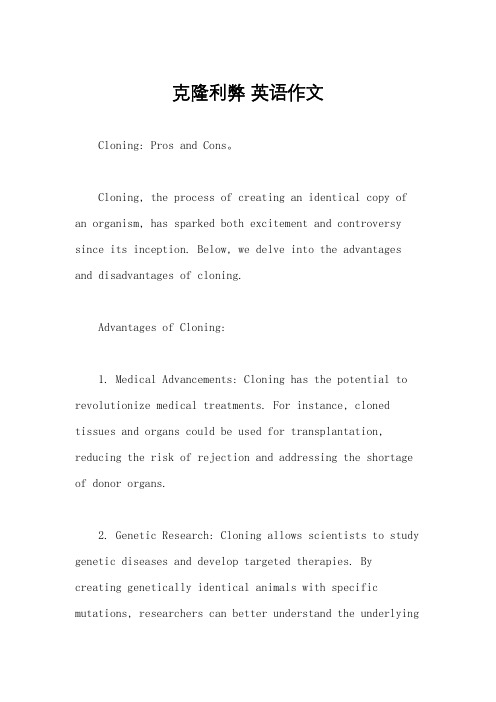
克隆利弊英语作文Cloning: Pros and Cons。
Cloning, the process of creating an identical copy of an organism, has sparked both excitement and controversy since its inception. Below, we delve into the advantages and disadvantages of cloning.Advantages of Cloning:1. Medical Advancements: Cloning has the potential to revolutionize medical treatments. For instance, cloned tissues and organs could be used for transplantation, reducing the risk of rejection and addressing the shortage of donor organs.2. Genetic Research: Cloning allows scientists to study genetic diseases and develop targeted therapies. By creating genetically identical animals with specific mutations, researchers can better understand the underlyingmechanisms of various disorders.3. Species Conservation: Cloning endangered species could prevent their extinction. By preserving genetic diversity, cloning offers hope for the survival of species facing extinction due to habitat loss, poaching, or other threats.4. Agricultural Benefits: Cloning can enhance agricultural productivity by producing genetically superior livestock and crops. This could lead to increased food production, improved resistance to diseases, and higher yields.Disadvantages of Cloning:1. Ethical Concerns: Cloning raises ethical questions about the sanctity of life and the potential exploitation of cloned organisms. Critics argue that cloning undermines the uniqueness and individuality of living beings.2. Health Risks: Cloned animals often suffer fromvarious health problems, including abnormalities, genetic defects, and premature aging. These health issues raise doubts about the safety and viability of cloning for medical and agricultural purposes.3. Loss of Genetic Diversity: Cloning reduces genetic diversity, which is essential for the long-term survival of species. Over-reliance on cloned individuals could make populations more vulnerable to diseases and environmental changes.4. Social Implications: Cloning could have profound social implications, such as altering family dynamics and challenging traditional concepts of parenthood. Additionally, the commercialization of cloning raises concerns about inequality and access to cloning technologies.In conclusion, cloning offers both promising opportunities and significant challenges. While it holds the potential for medical breakthroughs, species conservation, and agricultural advancements, it also raisesethical, health, and social concerns that must be carefully considered. As technology continues to advance, it is essential to approach cloning with caution and ethical responsibility.。
关于克隆好处与坏处的英语作文

关于克隆好处与坏处的英语作文Cloning technology is a controversial topic, with varying opinions on its merits and demerits. Some people support it, some oppose it, and others are undecided. Indeed, cloning has both advantages and disadvantages.The benefit of cloning lies in its ability to produce genetically identical individuals, which simplifies medical research. Take Dolly the Sheep as an example, the first mammal cloned through somatic cell nuclear transfer.A small portion of her tissue can be used to study various diseases, and her organs can potentially save lives. Additionally, cloning can be applied to replicate endangered animals, preserving biological diversity. We can even freeze rare animals' cells, giving them a chance at life in the future.However, cloning also has negative impacts. Firstly, as it often involves living organisms, ethical questions arise. Human cloning, for instance, can lead to violations of human dignity and goes against natural laws. Moreover, cloning is expensive, making it susceptible to misuse for commercial gain. Also, the success rate of cloning is currently low, with most clones perishing shortly after birth, and survivors often suffer from congenital defects.Therefore, we should approach cloning technology with caution, weighing the benefits against the risks. We need to be in control of this technology rather than being controlled by it, ensuring it doesn't pose a threat to humanity.""克隆技术,一提到这个词,人们的反应不尽相同:有人赞同、有人反对、有人犹豫不决。
基因克隆利弊英文作文
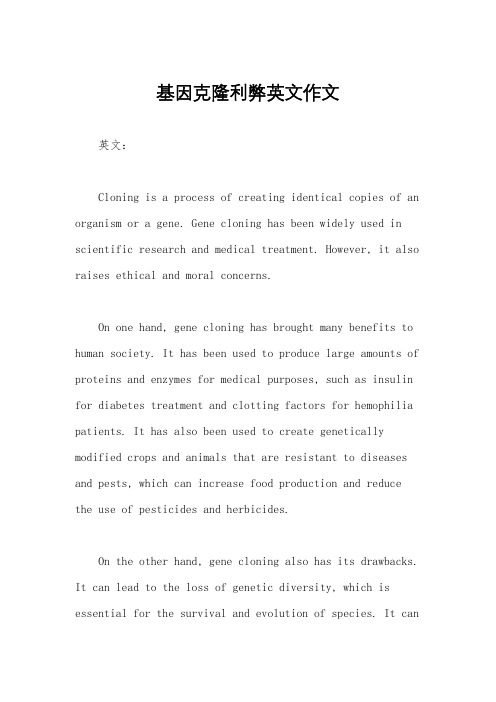
基因克隆利弊英文作文英文:Cloning is a process of creating identical copies of an organism or a gene. Gene cloning has been widely used in scientific research and medical treatment. However, it also raises ethical and moral concerns.On one hand, gene cloning has brought many benefits to human society. It has been used to produce large amounts of proteins and enzymes for medical purposes, such as insulin for diabetes treatment and clotting factors for hemophilia patients. It has also been used to create genetically modified crops and animals that are resistant to diseases and pests, which can increase food production and reduce the use of pesticides and herbicides.On the other hand, gene cloning also has its drawbacks. It can lead to the loss of genetic diversity, which is essential for the survival and evolution of species. It canalso create unintended consequences, such as the spread of genetically modified organisms to the environment and the potential harm to other species. Moreover, gene cloning can be misused for unethical purposes, such as cloning humans for reproductive purposes or creating superhumans.In my opinion, gene cloning should be used cautiously and responsibly. It should be strictly regulated to prevent its misuse and ensure its safety. Scientists should also explore other methods, such as gene editing, which can achieve similar goals without the risks and ethical concerns of gene cloning.中文:基因克隆是一种创建生物或基因的完全相同副本的过程。
克隆的利弊英语作文

克隆的利弊英语作文The Pros and Cons of Cloning。
Cloning, the process of creating an identical copy of an organism, has been a topic of controversy and debate since it was first successfully achieved with the cloning of Dolly the sheep in 1996. While some view cloning as a breakthrough in science and technology, others see it as a dangerous and unethical practice. In this article, we will explore the pros and cons of cloning.Pros of Cloning。
1. Medical Advancements。
Cloning has the potential to revolutionize the field of medicine. By cloning human organs, doctors could provide patients with a limitless supply of organs for transplant. This would save countless lives and reduce the need for organ donors.2. Preservation of Endangered Species。
Cloning could be used to preserve endangered species by creating clones of animals that are on the brink of extinction. This would help to maintain biodiversity and prevent the loss of important species.3. Genetic Modification。
克隆利弊的英语作文
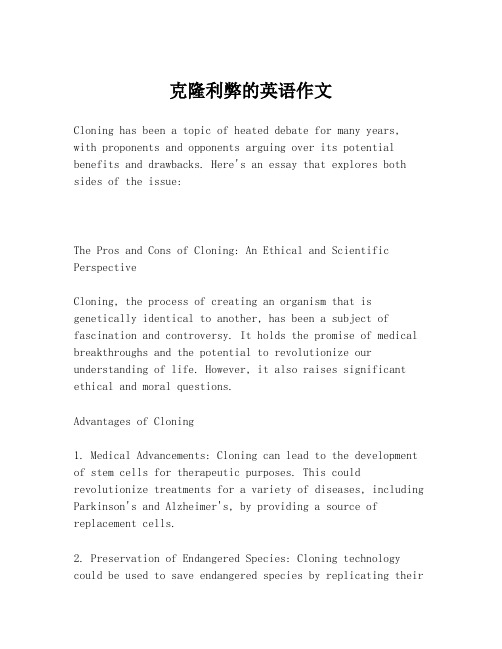
克隆利弊的英语作文Cloning has been a topic of heated debate for many years, with proponents and opponents arguing over its potential benefits and drawbacks. Here's an essay that explores both sides of the issue:The Pros and Cons of Cloning: An Ethical and Scientific PerspectiveCloning, the process of creating an organism that is genetically identical to another, has been a subject of fascination and controversy. It holds the promise of medical breakthroughs and the potential to revolutionize our understanding of life. However, it also raises significant ethical and moral questions.Advantages of Cloning1. Medical Advancements: Cloning can lead to the development of stem cells for therapeutic purposes. This could revolutionize treatments for a variety of diseases, including Parkinson's and Alzheimer's, by providing a source of replacement cells.2. Preservation of Endangered Species: Cloning technology could be used to save endangered species by replicating theirgenetic material, thus ensuring their survival.3. Agricultural Benefits: In agriculture, cloning can be used to produce genetically identical plants with desirable traits, such as disease resistance or increased yield.4. Scientific Research: Cloning provides a way to studygenetic diseases and conditions in a controlled environment, which can lead to a better understanding of genetics and the development of new treatments.Disadvantages of Cloning1. Ethical Concerns: The creation of a cloned human raises questions about the sanctity of life and the potential for creating 'designer babies', where parents could selectspecific traits for their offspring.2. Identity and Individuality: Cloned individuals maystruggle with issues of identity and individuality, as they would be genetically identical to another person.3. Potential Health Risks: There are concerns that cloned animals have shown higher rates of health problems, whichcould translate to humans if cloning were pursued.4. Social and Legal Implications: Cloning challenges oursocial and legal frameworks, as it is unclear how cloned individuals would be treated under the law, particularly regarding issues of inheritance and legal identity.ConclusionWhile cloning offers the potential for significant advancements in medicine and biology, it also presents a complex array of ethical and social challenges. As a society, we must carefully consider the implications of cloning and establish guidelines that protect the rights and well-being of all individuals involved.This essay provides a balanced view of the potential benefits and drawbacks of cloning, encouraging readers to consider the complexities of this scientific endeavor.。
克隆利弊英文作文

克隆利弊英文作文英文:Cloning is a controversial topic that has sparked debate for many years. On one hand, cloning has the potential to advance scientific research and improve medical treatments. On the other hand, it raises ethical and moral concerns.One advantage of cloning is that it can help researchers better understand genetic diseases and develop new treatments. For example, scientists have successfully cloned animals with genetic disorders, such as cystic fibrosis, to study the disease and develop potential treatments. Cloning also has the potential to create organs for transplant, which could save countless lives.However, cloning also has its drawbacks. One major concern is the possibility of creating clones for unethical purposes, such as creating a superior race or producinghuman clones for organ harvesting. Additionally, cloningcan result in genetic abnormalities and health issues forthe cloned individual.Overall, while cloning has its benefits, the potential risks and ethical concerns cannot be ignored. It is important for scientists and policymakers to carefully consider the implications of cloning before moving forward with any research or applications.中文:克隆是一个引发争议已久的话题。
英语作文克隆的利弊
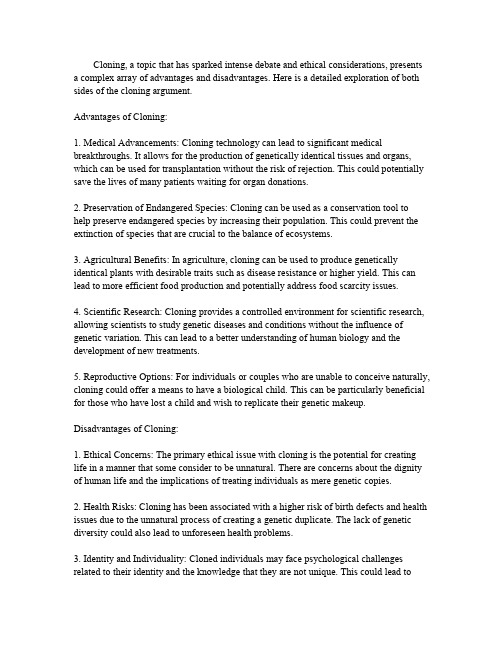
Cloning,a topic that has sparked intense debate and ethical considerations,presents a complex array of advantages and disadvantages.Here is a detailed exploration of both sides of the cloning argument.Advantages of Cloning:1.Medical Advancements:Cloning technology can lead to significant medical breakthroughs.It allows for the production of genetically identical tissues and organs, which can be used for transplantation without the risk of rejection.This could potentially save the lives of many patients waiting for organ donations.2.Preservation of Endangered Species:Cloning can be used as a conservation tool to help preserve endangered species by increasing their population.This could prevent the extinction of species that are crucial to the balance of ecosystems.3.Agricultural Benefits:In agriculture,cloning can be used to produce genetically identical plants with desirable traits such as disease resistance or higher yield.This can lead to more efficient food production and potentially address food scarcity issues.4.Scientific Research:Cloning provides a controlled environment for scientific research, allowing scientists to study genetic diseases and conditions without the influence of genetic variation.This can lead to a better understanding of human biology and the development of new treatments.5.Reproductive Options:For individuals or couples who are unable to conceive naturally, cloning could offer a means to have a biological child.This can be particularly beneficial for those who have lost a child and wish to replicate their genetic makeup. Disadvantages of Cloning:1.Ethical Concerns:The primary ethical issue with cloning is the potential for creating life in a manner that some consider to be unnatural.There are concerns about the dignity of human life and the implications of treating individuals as mere genetic copies.2.Health Risks:Cloning has been associated with a higher risk of birth defects and health issues due to the unnatural process of creating a genetic duplicate.The lack of genetic diversity could also lead to unforeseen health problems.3.Identity and Individuality:Cloned individuals may face psychological challenges related to their identity and the knowledge that they are not unique.This could lead toissues with selfesteem and a sense of individuality.4.Social Implications:The introduction of cloned individuals into society could lead to complex social dynamics,including questions about legal rights,social status,and the potential for discrimination.5.Potential for Abuse:There is a risk that cloning technology could be misused for unethical purposes,such as creating a workforce or soldiers with specific traits,or for the replication of individuals for personal gain.6.Economic and Resource Allocation:The resources required for cloning,including scientific expertise and technological infrastructure,could divert funds and attention away from other important areas of research and development.In conclusion,while cloning offers potential benefits in various fields,it also raises significant ethical,health,and social concerns.The debate surrounding cloning is far from resolved,and it is crucial that society continues to engage in thoughtful discussions about the implications of this technology.。
克隆技术利弊英语作文
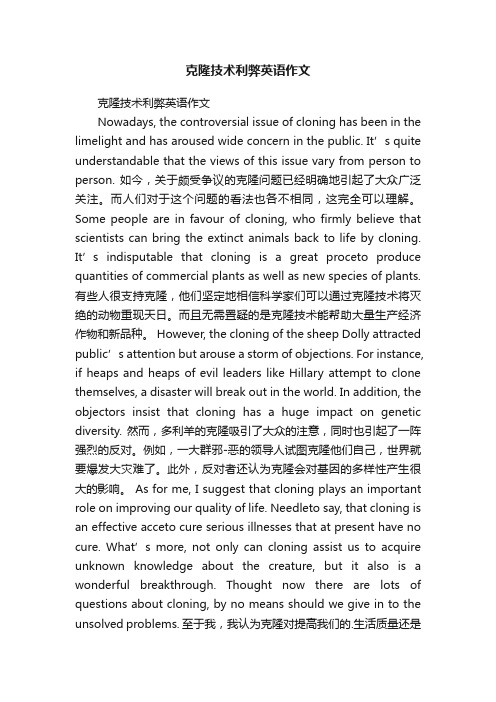
克隆技术利弊英语作文克隆技术利弊英语作文Nowadays, the controversial issue of cloning has been in the limelight and has aroused wide concern in the public. It’s quite understandable that the views of this issue vary from person to person. 如今,关于颇受争议的克隆问题已经明确地引起了大众广泛关注。
而人们对于这个问题的看法也各不相同,这完全可以理解。
Some people are in favour of cloning, who firmly believe that scientists can bring the extinct animals back to life by cloning. It’s indisputable that cloning is a great proceto produce quantities of commercial plants as well as new species of plants. 有些人很支持克隆,他们坚定地相信科学家们可以通过克隆技术将灭绝的动物重现天日。
而且无需置疑的是克隆技术能帮助大量生产经济作物和新品种。
However, the cloning of the sheep Dolly attracted public’s attention but arouse a storm of objections. For instance, if heaps and heaps of evil leaders like Hillary attempt to clone themselves, a disaster will break out in the world. In addition, the objectors insist that cloning has a huge impact on genetic diversity. 然而,多利羊的克隆吸引了大众的注意,同时也引起了一阵强烈的反对。
对克隆人的看法,好处和坏处英语作文
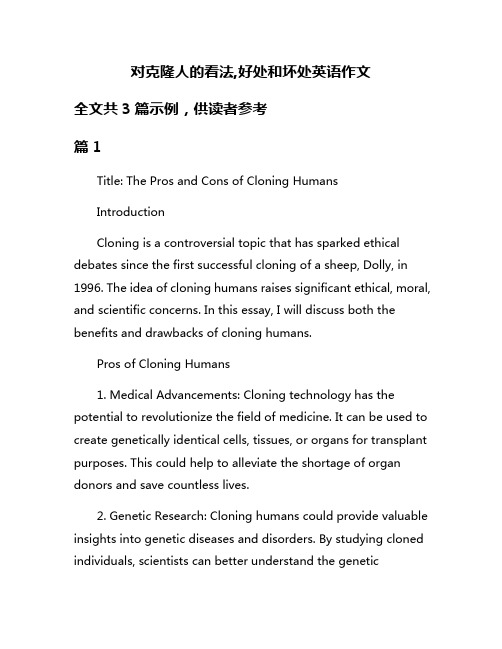
对克隆人的看法,好处和坏处英语作文全文共3篇示例,供读者参考篇1Title: The Pros and Cons of Cloning HumansIntroductionCloning is a controversial topic that has sparked ethical debates since the first successful cloning of a sheep, Dolly, in 1996. The idea of cloning humans raises significant ethical, moral, and scientific concerns. In this essay, I will discuss both the benefits and drawbacks of cloning humans.Pros of Cloning Humans1. Medical Advancements: Cloning technology has the potential to revolutionize the field of medicine. It can be used to create genetically identical cells, tissues, or organs for transplant purposes. This could help to alleviate the shortage of organ donors and save countless lives.2. Genetic Research: Cloning humans could provide valuable insights into genetic diseases and disorders. By studying cloned individuals, scientists can better understand the geneticmechanisms behind diseases and develop more effective treatments.3. Reproductive Technology: Cloning could offer infertile couples the opportunity to have genetically related children. It could also help same-sex couples have biological children without the need for a third-party donor.4. Preservation of Endangered Species: Cloning technology could be used to preserve endangered species by creating genetically identical individuals. This could help to prevent the extinction of species that are on the brink of disappearing.Cons of Cloning Humans1. Ethical Concerns: Cloning raises significant ethical questions about the nature of individuality, identity, and human dignity. Cloned individuals may be treated as mere copies of their genetic donors, leading to a loss of individuality and autonomy.2. Health Risks: Cloning is associated with a range of health risks, including genetic abnormalities, premature aging, and organ failure. Cloned individuals may suffer from a range of physical and mental health issues that could impact their quality of life.3. Social Implications: Cloning could have far-reaching social consequences, such as the creation of a genetic underclass or the reinforcement of social inequalities. It could also lead to the commodification of human life and the exploitation of vulnerable individuals.4. Unpredictable Consequences: Cloning humans is a complex and multifaceted process that could have unintended consequences. The long-term effects of cloning on individuals, families, and society as a whole are unknown and difficult to predict.ConclusionIn conclusion, cloning humans has the potential to bring about significant medical advancements and genetic research. However, it also raises important ethical, health, social, and moral concerns that must be carefully considered. The decision to clone humans should be made with caution and with a full understanding of the risks and benefits involved. Ultimately, the debate over cloning will continue to evolve as scientific advancements and ethical considerations progress.篇2Title: View of Cloning - Pros and ConsCloning, the process of creating an identical copy of a living organism, has been a subject of controversy and debate for many years. Some people see cloning as a breakthrough in science and medicine, while others view it as unethical and dangerous. In this essay, we will explore the various arguments for and against cloning and discuss its potential benefits and drawbacks.One of the main benefits of cloning is the potential to create organs and tissues for use in transplants. By cloning healthy cells from a patient's own body, doctors could theoretically create replacement organs that are genetically identical to the patient, reducing the risk of rejection and improving the success rate of transplants. This could revolutionize the field of organ transplantation and save thousands of lives.Another potential benefit of cloning is the ability to reproduce endangered or extinct species. By cloning endangered animals, scientists could help preserve biodiversity and prevent species from becoming extinct. In addition, cloning could be used to study genetic diseases and develop new treatments for a variety of medical conditions.However, there are also numerous ethical concerns surrounding cloning. Many people argue that cloning is aviolation of nature and undermines the uniqueness and individuality of living organisms. Cloning raises questions about the value of human life and the potential consequences of playing "god" by creating life in a laboratory.Furthermore, there are serious safety concerns associated with cloning. The process of cloning can result in genetic abnormalities and health problems in the cloned organism. There is also the risk of unintended consequences, such as creating new diseases or introducing harmful mutations into the gene pool.In conclusion, cloning has the potential to benefit society in many ways, from providing organs for transplants to preserving endangered species. However, the ethical and safety concerns surrounding cloning cannot be ignored. It is crucial that we carefully consider the implications of cloning and weigh the potential benefits against the risks before moving forward with this technology. Only through thorough research and thoughtful consideration can we ensure that cloning is used responsibly and ethically.篇3Cloning, the process of creating genetically identical copies of an organism, has been a topic of ethical and scientific debate for many years. The idea of cloning humans, in particular, raises numerous ethical concerns and has sparked heated discussions among scientists, ethicists, and the general public. In this essay, I will discuss the advantages and disadvantages of cloning humans and provide my perspective on the matter.Advantages of Human Cloning:1. Medical Advancements: Cloning technology has the potential to revolutionize the field of medicine by providing a means to create organs and tissues for transplantation. This could help alleviate the shortage of donor organs and save the lives of thousands of people waiting for transplants.2. Genetic Engineering: Cloning humans could also be used for genetic engineering purposes, allowing scientists to study and modify genes to prevent genetic diseases or enhance certain traits. This could lead to the development of personalized medicine and treatments tailored to an individual's genetic makeup.3. Reproductive Rights: Cloning could offer infertile couples or same-sex couples the opportunity to have genetically related children. This could provide a solution for those struggling withinfertility or facing genetic disorders that could be passed on to their offspring.Disadvantages of Human Cloning:1. Ethical Concerns: The main argument against human cloning is the violation of individual autonomy and dignity. Cloning could result in the devaluation of human life as individuals are treated as commodities or means to an end, rather than unique and valuable beings.2. Health Risks: Cloning comes with a number of health risks, as cloned organisms often suffer from genetic abnormalities and diseases. The cloning process can also result in a high rate of miscarriages and stillbirths, raising concerns about the welfare of the cloned individuals.3. Social Implications: Cloning humans could havefar-reaching social implications, such as the potential for discrimination, identity issues, and the creation of a genetic underclass. It could also raise questions about the concept of family and what it means to be a parent or a sibling.My Perspective on Human Cloning:While I recognize the potential benefits of human cloning in terms of medical advancements and reproductive rights, Ibelieve the ethical concerns and health risks associated with cloning outweigh the potential benefits. Human cloning raises fundamental questions about the nature of human identity, individuality, and the sanctity of life. It also poses significant risks to the health and well-being of the cloned individuals, making it an ethically questionable practice.In conclusion, human cloning is a complex and controversial issue that requires careful consideration and debate. While the technology holds promise for medical advancements and reproductive rights, the ethical concerns and health risks associated with cloning cannot be ignored. Ultimately, I believe that the potential harms of human cloning outweigh the potential benefits, and that caution should be exercised in the pursuit of this technology.。
- 1、下载文档前请自行甄别文档内容的完整性,平台不提供额外的编辑、内容补充、找答案等附加服务。
- 2、"仅部分预览"的文档,不可在线预览部分如存在完整性等问题,可反馈申请退款(可完整预览的文档不适用该条件!)。
- 3、如文档侵犯您的权益,请联系客服反馈,我们会尽快为您处理(人工客服工作时间:9:00-18:30)。
克隆利弊的英语作文3篇
各位读友大家好!你有你的木棉,我有我的文章,为了你的木棉,应读我的文章!若为比翼双飞鸟,定是人间有情人!若读此篇优秀文,必成天上比翼鸟!
克隆利弊的英语作文一:克隆技术利弊(1050字)with the development of science and technology, our side appeared a lot of new things,such as clone,the scientific invention of clone has become a hot topic among people,especially among the young and heated debates are right on their way. now the cloning scientific has been used for many years to produce plants, it has brought us a lot of benefits but has created some serious problems as well. the benefit of cloning is cloning human organs or body parts , such as that if a parson in a traffic accident lost his arm or leg ,or someone get a serious heart disease and
face danger ,he need a new body parts replace ,at this time we can use cloning technology copy a new parts of body to replace ,in the this way can be ensure that someone continue to live ,so that the clone is benefit for us . everything has two sides and cloning is not an exception,it has both advantages and disadvantages. on the contrary,most people are against of cloning technology been used in our life, one of the biggest reason is that human cloning technology will break the gender balance,it will be bring up a great chaos. as far as i think cloning technology is more much disadvantage for human being ,we should very careful to use it, i believe that only in this way our life will be more beautiful克隆利弊的英语作文二:克隆的好处与坏处(1920字)advanced technology has already pushed human being to edges,such as the production of weapons of mass destruction,the
destruction of ozone by freon ,and the application of clone.the heated deabte over whether cloning technique should be used in human reproduc--tion must be considered as a serious issue.clone, to a certain degree, is beneficial to mankind.such disease as parkinsons will possiblly be cured in the future in the hope of further applying of clone.however,the abuse of this technology will bring human being unthinkable destruction.since the declaration of the death of dolly,we are more conscious of the inefficient procedure of clone.acorrding to “dolly’s false legacy”,the incidence of death among fetuses and offspring produced by cloning is much higher than it is through natural reproduction--roughly 10 times as high as normal before birth and 3 times as high after birth.and even you may argue that this technology will be perfected in the future, i don’t see there is any point in
whole--being cloning.many people consider this technology a promising one as to bring all human being to a new era in which all human reproduction will be accomplished by cloning.thus scientists in some countries have already started their great plan to clone human.but let’s think, what is the practical value in doing so?you may tell me that it can bring hope for those couples unable to have children because they might choose to have a copy of one of them rather than accept the gene intrusion from a doner.but imagine,if you have a child owning the same apperance as yours or your husband’s, will you accept it without any uncomfort?
各位读友大家好!你有你的木棉,我有我的文章,为了你的木棉,应读我的文章!若为比翼双飞鸟,定是人间有情人!若读此篇优秀文,必成天上比翼鸟!。
